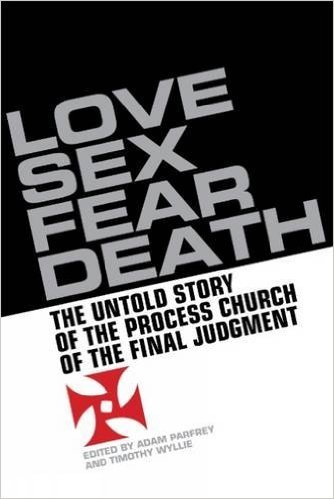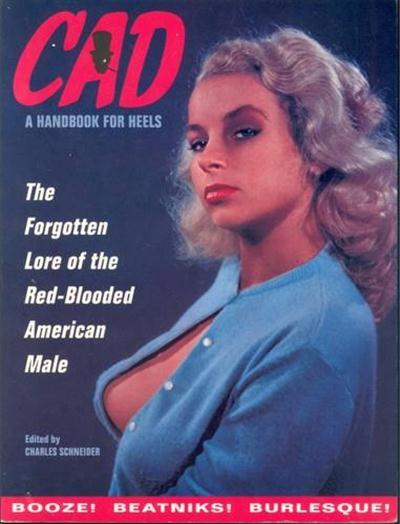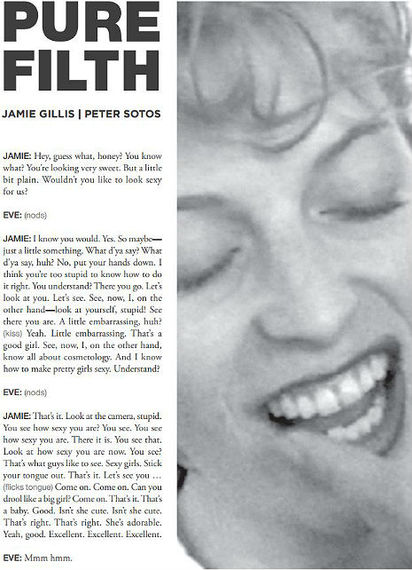Publisher Adam Parfrey was in town a few weeks ago for the Brooklyn Book Festival. I caught up with Adam at his hotel room to discuss the history of his publishing imprints Feral House and Process Media as well as several other things.
Since the 1990's Feral House has always been one of my favorite book publishers due to my active interest in the occult, forbidden sex, political corruption, macabre photographs, drugs, obscure music cultures and buried truths among other commonly unclassifiable subjects. Parfrey has always had his eye on the next hidden story.
This is part two of a two part interview for Huffington Post. You can read the first part here. I encourage you to do so to get the most out of your time with us.
MLN: It seems like the Feral House does one thing and Process does a completely other thing, but they still seem like they're connected, to me, because they're both non-fiction, a little fringe, you know? Did you get the name for Process from The Process Church?
AP: No, actually. [laughs]
MLN: [laughs] Because, I know that's something that interests you. It's something that interests me.
AP: Yeah, definitely. No, the Process idea came from - everybody was - this is the discussion I had with Jodi - that everybody is interested in the end result, but we were thinking about this whole business is about processing ideas, about going through a situation. It's just not an end result thing, solely. It's how our life goes and that's what these books are. They're not simply an object. They're all this shit we went through, that this object is a manifest of it. So I thought, "Well, let's call it process." And she was against the idea because it had that tie-in with The Process Church, but it really wasn't, although we had done for Process, books about the Source Family and other cult commune type things that was a Process Church-like thing. It's a curious thing.
MLN: Yeah, they're not connected, though. So, what prompted the move of the company from LA to Port Townsend?
AP: Personally, I had a really great place in LA and we had these so-called salons. It was in this old storybook style house in this compound, an actor, Bud Cort lived in this compound, and various houses. It was just like this delightful thing. Between Silver Lake and Los Feliz area - Franklin Hills, it was called. But we're in the middle of LA and I didn't feel like this is a long-lasting situation for me or for the business or for anything. I thought that, I'd like to get to a place - I wasn't able to have an animal there, I wasn't able to grow stuff there because of the landlord situation. So, I felt limited by that. I felt limited by LA in a way that I wasn't really - everything had changed in the industry. You don't do as much in person stuff as online on the phone, and there's Fedex. It was like, what was I doing? So it was LA, rather than New York initially, and now it's Port Townsend, rather than LA because it's the openness of the way things work these days, in terms of the shipping stuff and meeting people. All that.
MLN: Which books offended people the most?
AP: I was surprised sometimes by that. For example, when a book came out - it's no longer in print - but, it was this book called Cad: A Handbook for Heels. It was sort of like a takeoff of a 50s men's magazine. Not Playboy, but like a sub-Playboy magazine. So I had a friend, Charles Schneider pitched - I got into the idea. So we're "let's play as if we're doing one of those magazines and have illustrators involved." Dan Clowes was highly involved in that one and "Coop", like Christopher Cooper and other people. And that was fun because we're just playing around with this idea, this long lost, in terms of the way men are considered and women are considered in a way these publications were considered. So, the book came out and lot of people thought it was great fun and they loved it, but other people got very offended by it.
There was a store, I think it was in Victoria, Canada. It's not far from where I am now. It was a gay/lesbian store. They invaded the store and seized copies of that Cad book as bad material that insulted women because of these new laws, these Andrea Dworkin/MacKinnon laws that came about around that time. And so, it was a banned book, it became in Canada, at least. And so, that hadn't happened before. And think about that. If you think about - the book is selling at a gay/lesbian store and now it was proscribed because it was anti-woman? That was weird.
MLN: It's weird, yeah. You'd think that that would be a real open-minded place. Well, I'm surprised. I thought you were gonna say the Peter Sotos/Jamie Gills one, because that one's pretty severe. I mean, I'm not a moralist. I don't care, but that was surprising. I was like "Wow, this one's pretty out there!"
AP: Well, it's totally out there, yeah. But the thing is, the way things are proscribed now or banned now, is simply that they're ignored.
MLN: [laughs] That's probably the most effective. Give anything attention, it just turns into something bigger.
AP: We ran into a lot of problems with the book Ian Brady wrote when it first came out, particularly in England. And that came out like a month before the 911 happened. So for a while, it was a big fucking deal, particularly in the UK. I was interviewed by BBC quite a bit and they set up little things where they had some people from the Church on one side, and I'm on the other side arguing with what's happening about that book. That also happened with that Death Scenes book, although it was created by a cop to teach anti-crime stuff to children. But it's a pretty severe book. It was from this cop's scrap book, that he would intimidate kids from committing crimes with.
MLN: I mean, that's why, actually I read that the libraries in the United States are the last ones to hold out on NSA requests, that they are still holding out on not giving up any information on what people take out.
AP: Well, there's one issue about libraries that I don't really like. And that is this. I don't think they're doing this on purpose, but libraries across America have this software on their computers. If a library patron uses it, they're unable to get into certain websites.
MLN: Oh yeah, blocked right?
AP: Feral House website is blocked by most libraries in America.
MLN: That's not cool.
AP: And, you know, we're talking about free speech and libraries and knowledge.
MLN: Yeah, yeah.
AP: Information. And they pat themselves on the back. They have this thing every year about banned books and all that, but they ban books themselves! But they don't see it that way. It's fucked up.
MLN: Yeah, it is fucked up.
AP: So, of course I support their banned books leak thing that they do, but they just ignore the fact that there are thousands of patrons who use their computers who can't reach a lot of books.
MLN: Right, people who can't afford their own computers or whatever and that's their only outlet.
AP: Yeah, I was written to by a number of people about that. They were trying to find stuff that they heard about - word of mouth about Feral House - and they couldn't access it in their library.
MLN: What I like about Feral House is that you don't seem to take a moral position on the authors, whether we're talking about Peter Sotos or Ian Brady or Ted Kaczynski or something. You're able to separate ideas from whatever the motivations are that drives people.
AP: I don't think they're ideas. I think it's simply information. That's like, you can have an opinion whether this information is worthwhile or of mixed - there may be whites and darks and whites about it that you can understand and you object to, but for things to be put out of people's' fear of ability to intake that, it's disturbing to me, personally. Because then the moral judgment is made immediately without even knowing what it is you're supposed to be against. You hear these names, TV news will tell you about how racism is bad, that you hate everyone else? What is racism? What is this factor? What was being taught in the United States, like in the State of California in the 1920s and 1930s, but full on eugenics? That later, the Third Reich used as a model for their own eugenic idea. It came from the State of California. Yeah, but you don't hear about that. I think I put that in the Apocalypse Culture book. There's a chapter on eugenics and what that is and what it was and the history of it. But it was simply from my own investigation way back in the 80s that I knew that, but that's not really taught, that's not understood. America's supposed to be this model of free discourse, you know. It's not really.
MLN: Of course, it never stops. And then my final question is that, do you think that a counter culture actually exists?
AP: Okay, well it's not the same idea as before, I don't think. So I know what John Waters told me, in answer to that question. He says, "everything is culture. Werner Herzog, that's who said this, not John Waters. So I was having dinner with Werner Herzog and Crispin Glover at some place in Malibu Canyon, LA, where they serve game-type dinners. And so, I don't know how the topic came up, but that's what he said. He was very adamant about it. There's no such thing as counterculture. It's all part of the culture.
MLN: I think that's right.
AP: Yeah, and so they'd called counter cultured things like smaller, small time things - things not backed by big money and what have you.
MLN: But even things that are backed by big money are considered counter culture. Like, look at the 1960s record labels and the counterculture which was the mainstream culture from the 1960s forward.
AP: Well, what's interesting to me is the way certain subjects become provocative, when they become bad, so-called "bad" topics. You shouldn't discuss it. You shouldn't have the ability to open up a conversation about it even. And then when that happens, it sort of sparks me because of that. This idea of - in Communist Soviet Union, that was going on quite a bit - what you can say, what you can't say. Of course, Germany during the Third Reich - that was the biggest idea. And so, whatever I do, if it doesn't follow that it's a mainstream New York Times thing, or that people say "you shouldn't do that. Those are bad people." Then I go, "Whoa, let's examine this. What's bad?" These people, they could be idiots, they could be assholes, but it was part of the fucking culture at the time. Like for example, this book coming out about white nationalist skinhead movement. It was a movement. It was a big movement at the time in the UK and partly in the U.S. for a bit, but does that mean we shouldn't discuss them? Does that mean they disappeared? Does that mean we're better people because we looked away? That really provokes me.
MLN: You find this with certain subjects like child molesting. You can't have an honest discussion about it without being considered "pro" or "against." Like, if you talk about it, you're considered "pro."
AP: Right. Well that was the situation with the second Apocalypse Culture. It's about artists who did particular types of art, this Palestinian guy, Ghazi Barakat wrote about it and another guy who wrote an article about it and their specific ideas, there's German artists, there's American artists, there's a crippled American artist named Stu Mead, who did the drawings. Then I reproduced art and learned that it was considered pornography when it wasn't really pornography. It was just a drawing of an artist's idea -
MLN: I'm sorry, is there a story about how the distributor wouldn't put it out the way it was? Didn't you have to change something?
AP: No, what it was, the printer wouldn't print it.
MLN: Yeah, that was it.
AP: Yeah, even when we put blacked out portions of the image, so we got through that printing, but they wouldn't do another printing. But, at that time, particularly, in societal wide idea, that you should not discuss this, or print an artwork that shows certain things. And it's just too much, you just can't do it. It's not that you personally think, "Oh, that's great! Yeah, I'm gonna jerk off now." [laughs] That's not the idea. It got kinda crazy.
MLN: So, that taboo interests you over and over again, no matter what the taboo is. That sparks you to open it up and investigate it.
AP: Yeah, in some respects, that's true because you know what's important societally by these objectionable things that you're not allowed to speak about, think about or do. This week is different from last week's version, you know? There's always something that's coming up there. I could look at Huffington Post and I say, "Oh, this is the big front page headline. So this week, we're talking about racists, because they never awarded a black woman a "Best Actress" award in a TV series" thing. That was today's, right. So, that's such a big deal for this limited purview of what's allowed, what's not allowed and all that stuff, but then it becomes - that particular one becomes a big deal, but others cannot become a big deal in Huffington Post. And they're just as taken out of the main conversation. I don't know.
MLN: This conversation will get buried in the arts page.



